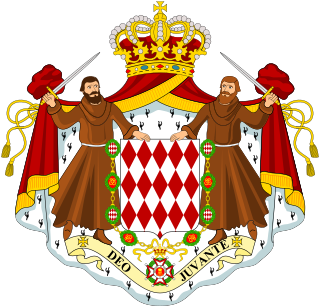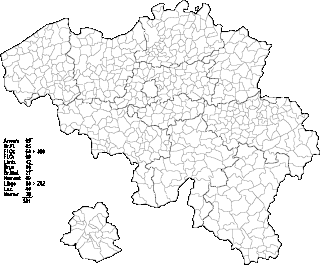
The politics of Monaco take place within the framework of a constitutional monarchy, with the Prince of Monaco as head of state, with some powers devolved to several advisory and legislative bodies.
In many countries, a mayor is the highest-ranking official in a municipal government such as that of a city or a town.

Belgium comprises 581 municipalities grouped into five provinces in each of two regions and into a third region, the Brussels-Capital Region, comprising 19 municipalities that do not belong to a province. In most cases, the municipalities are the smallest administrative subdivisions of Belgium, but in municipalities with more than 100,000 inhabitants, on the initiative of the local council, sub-municipal administrative entities with elected councils may be created. As such, only Antwerp, having over 500,000 inhabitants, became subdivided into nine districts. The Belgian arrondissements, an administrative level between province and municipality, or the lowest judicial level, are in English sometimes called districts as well.

The Constitution of Monaco, first adopted in 1911 after the Monégasque Revolution and heavily revised by Prince Rainier III on 17 December 1962, outlines three branches of government, including several administrative offices and a number of councils, who share advisory and legislative power with the Prince.
The municipalities of Greece are the lowest level of government within the organizational structure of that country. Since the 2011 Kallikratis reform, there are 325 municipalities. Thirteen regions form the largest unit of government beneath the State. Within these regions are 74 second-level areas called regional units. Regional units are then divided into municipalities. The new municipalities can be subdivided into municipal units, which are subdivided into municipal communities or local communities.
In South Africa, a local municipality or Category B municipality is a type of municipality that serves as the third, and most local, tier of local government. Each district municipality is divided into a number of local municipalities, and responsibility for municipal affairs is divided between the district and local municipalities. There are 226 local municipalities in South Africa.
The 2015 Monegasque municipal elections were held on 15 March to elect the 15 members of the Communal Council of Monaco.
The 2011 Monegasque municipal elections were held on 13 March to elect the 15 members of the Communal Council of Monaco.
The 2007 Monegasque municipal elections were held on 4 March to elect the 15 members of the Communal Council of Monaco.
The 2003 Monegasque municipal elections were held on 2 March to elect the 15 members of the Communal Council of Monaco.
The 1999 Monegasque municipal elections were held on 21 February to elect the 15 members of the Communal Council of Monaco.
The 1995 Monegasque municipal elections were held on 19 February to elect the 15 members of the Communal Council of Monaco.
The 1991 Monegasque municipal elections were held on 10 and 17 February to elect the 15 members of the Communal Council of Monaco.
The 1987 Monegasque municipal elections were held on 8 February to elect the 15 members of the Communal Council of Monaco.
The 1983 Monegasque municipal elections were held on 8 February to elect the 15 members of the Communal Council of Monaco.
The 1979 Monegasque municipal elections were held on 11 February to elect the 15 members of the Communal Council of Monaco.
The 1975 Monegasque municipal elections were held on 16 February to elect the 15 members of the Communal Council of Monaco.
The 1971 Monegasque municipal elections were held on 7 February to elect the 15 members of the Communal Council of Monaco.
The 1967 Monegasque municipal elections were held on 25 February and 3 March to elect the 15 members of the Communal Council of Monaco.
The 1963 Monegasque municipal elections were held on 10 March to elect the 15 members of the Communal Council of Monaco.




